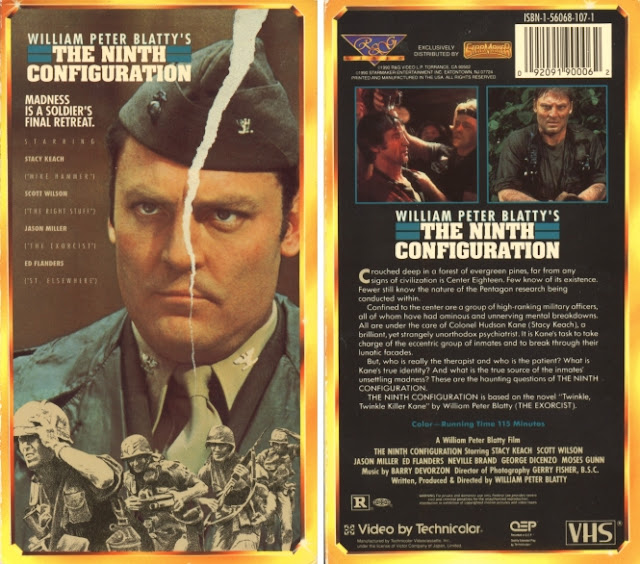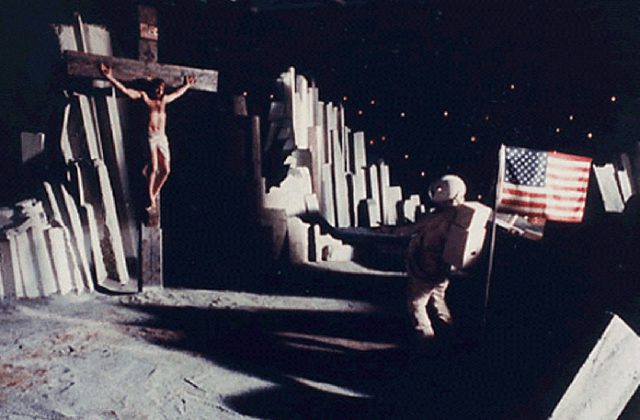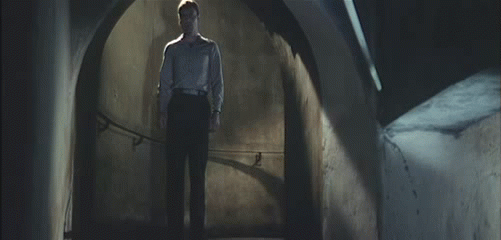Horror is subjective. Filmmaker Darren Aronofsky once referred to his gut-wrenching drug drama
Requiem for a Dream as a horror film. Same for Paul Thomas Anderson’s
There Will Be Blood, or Frances Ford Coppola’s
Apocalypse Now. There need not be a supernatural presence, a masked antagonist, or a family of cannibals for something to be considered a horror film. Sometimes the characters within the story need to be ailing from horrific misdeeds, or actions, or turmoil within themselves. Sometimes the horror results from an act that our lead character regrets. Sometimes it results from a series of decisions that our lead makes, which set off a chain of events from which there is no coming back, and which will spell doom for everyone connected to him or her. And sometimes the horror comes from a severe religious conflict – a lack of faith by a formerly faithful person. For the second time, that first being
The Exorcist, writer/director William Peter Blatty explores the idea of the loss of faith – how horrible it must be to question everything, to discount the notion that such things as “good” may exist in the world, and how hopeless it must be to feel so alone.
High in a mountainous region of the Pacific Northwest resides an old castle, which the American government has appropriated as a mental hospital – called “Center 18” – for its military personnel from the Vietnam War. A stoic and mysterious man named Colonel Hudson Kane (Stacy Keach,
Road Games), a former member of a United States Marine Corps special unit, arrives at the castle for his assignment: while there under the guise of overseeing the treatment of all the patients, really he’s been sent to determine if any or all of the patients are actually faking their psychoses to avoid going back to Vietnam. While there he meets Colonel Fell (Ed Flanders,
The Exorcist III), a fellow psychiatrist who will be on hand to help Kane settle into his new role. Upon meeting him, the crux of “Center 18” is explained: the confined men are allowed to indulge in their own self-created and ridiculous role-playing fantasies as a means of therapy, and Colonel Fell encourages Kane to play along. Kane agrees, and not just because as the acting psychiatrist he believes in the technique, but because, just maybe, he’s playing a role, too – perhaps he’d been playing one before he ever arrived.
As one might imagine, a cast of colorful characters reside at the castle: there’s Frankie Reno (Jason Miller,
The Exorcist), a former lieutenant attempting to put together a Shakespearean stage adaptation …using a cast of dogs; there’s Spinell (Joe Spinell,
Maniac), Reno’s number two; there’s Major Nammack (Moses Gunn,
Roots), who can be spotted wearing a “Super Nammack” costume; and let’s not forget Fromme (Blatty himself) playing a “System of Doctor Tarr and Professor Fether”-ish character who earns the film’s first big laugh. This film-quoting, mischief-making band of men will be the ones providing the comic relief, but it will be Captain Billy Cutshaw (Scott Wilson,
The Walking Dead), the former astronaut dealing with a crisis of faith, to whom Kane will gravitate, compelled by something unknown to get to the root of Cutshaw’s crisis and find a way to show him that there is good in the world. What occurs between them is an at-times preposterous ping pong game of philosophical debate, peppered with angered accusations, too-calm responses, and proclamations bordering on the absurd. (“The man in the moon fucked my sister!”) Cutshaw insists that no good – and hence, no god – exists in the world; only an instance of selfless self-sacrifice could ever convince him otherwise. Unmet demands that Kane cite just one example of such an instance seems only to bolster Cutshaw’s point. Cutshaw assumes himself to have won, but Kane won’t give in that easily. Though he shares the same jaded and depressing view of the world, he knows there’s enough goodness dwelling within it to cancel out the bad. He knows that the shepherd will sacrifice himself for the good of his flock. He just has to find a way to prove it.

The most remarkable thing about The Ninth Configuration is its blending together of multiple genres: drama, thriller, war, comedy, horror, existentialism, and for good measure, gothic mystery. It’d be difficult to point to one or two of these genres and say “it’s mostly this” because that’s utterly untrue. The film never stops being dramatic, comedic, thrilling, horrific, existential, or mysterious; instead, all of those genres work together in tandem to create the experience that is this wild, quirky, and inexplicable film culled entirely from the imagination of William Peter Blatty. At first based on an original novel called Twinkle, Twinkle, “Killer” Kane, it was then turned into a screenplay, which was then turned into a new novel, The Ninth Configuration. Rarely does it occur when there are two versions of the same book, by the same author, that are similar enough to be considered the same story, but different enough for those two stories to be told in such unique ways. The fate of the film, too, shares the fate of the book – several different cuts of the film have been circulating all over the world since its original theatrical debut, though the director’s preferred version wouldn’t “exist” until the 2001 DVD release by Warner Bros.
I say with distaste that the world will forever remember Scott Wilson as Herschel from
The Walking Dead (and indeed, he was the best thing about it), but the actor has been a remarkable performer for nearly fifty(!) years, hitting the scene big with a one-two punch of
In the Heat of the Night and
In Cold Blood. In
The Ninth Configuration, he’s given both his weightiest character and a rare lead role. Much like the dearly departed Robin Williams, Wilson retains that uncanny ability to make you laugh even as you can see in his eyes that he’s not laughing along with you. Though the most absurd dialogue flows from his mouth, there’s something festering inside him that hints at a profound sadness. His Cutshaw is haunted by the notion of being completely alone, and out there in the confines of space – the closest man will perhaps ever physically get to the perceived location of heaven – he wanted to feel closer to God. Instead, he felt more abandoned than ever. His mental breakdown unknowingly put him on the journey to meeting Keach’s Colonel Kane, a man who will prove to him that there is goodness in the world – even if he has to die trying.
Speaking of, Stacy Keach, playing “the greatest fucking psychiatrist since Jung,” is another actor rarely given a lead role, and he’s never been as good as he is here. For so much of the film, his performance is incredibly muted – almost artificially so – as if he’s just awoken from a very long sleep. But over time you will see him become reborn into something else – something more riveting, unhinged, exploding with passion. In one particular scene, he exudes such an immense magnitude of anger that his eyes fill with tears and his entire body shakes without control, and all while wearing a Nazi uniform. (It makes sense in context, trust me.) It’s an especially powerful scene in an especially powerful film. But then again, in the same film, he’s capable of delivering extremely melancholic monologues – musings on the very world to which he is trying to re-introduce his patients, but one that he himself doesn’t seem to entirely understand:
“Maybe we are just fish out of water. I just think about… sickness… cancer in children… earthquakes, war, painful death. Death. Just death. If these things are just part of our natural environment, why do we think of them as evil? Why do they horrify us so? Unless we were meant for someplace else. I don’t think evil grows out of madness. I think madness grows out of evil.”
Really, the entire cast work perfectly – each for their own parts, and as one unit of an ensemble: Jason Miller, Moses Gun, Tom Atkins, Robert Loggia, Richard Lynch, Neville Brand – it’s a who’s who of under-appreciated cult actors that should enthuse any appreciating film fan. (And let’s not forget Joe Spinell, who plays a character not present in any iteration of the literary story, but who flat-out told Blatty he wanted to be in the film, to which Blatty replied, “Well, all right,” and invited him to the set to ad-lib all his lines – hence his character’s name being “Spinell.”)
Nothing about The Ninth Configuration is extraneous or exploitative. Every scene – every exchange of dialogue, no matter how absurd – matters. It’s all urging the story toward its conclusion. One scene in particular between Miller and Keach – the “Hamlet theory” scene – really sums up the entire film. In the famous Shakespeare play, based on his eccentric behavior, there are two interpretations: either Hamlet is crazy, or he’s merely pretending to be. So the question posed to the two psychiatrists: is Hamlet crazy?
Kane says yes.
Fell says no.
Miller’s Reno smiles at them. “You’re both wrong.”
For a film in which it seemed actors had played musical chairs with their roles before finally settling on the character each would be playing, everyone hits home with their respective contributions and every one of the supporting character actors seem to be having a lot of fun. What sounds like what must have been chaos (and according to Tom Atkins, many of the actors felt stranded in the middle of nowhere in their shooting locale of Budapest, taking to drinking and fucking around to blow off steam) results in strong ensemble work where everyone plays off each other extremely well.
One of the biggest disservices in life seems to be that, except for this film, as well as the very underrated The Exorcist III, William Peter Blatty has remained away from the director’s chair. Though he continued to write until his death last year, he was an extremely focused and particular filmmaker. In a way, only the author of the source novel(s) could have been the one to bring this story to visual life. The divergent tone – comedy one minute and tragedy the next – would have sent many filmmakers scurrying, and when the dark and effective scenes were afoot, Blatty had only small bouts of limited screen time to convey his point. A man who once considered joining the priesthood, Blatty’s body of work has a strong (but not preachy) religious tone. It was Father Karras in The Exorcist (Jason Miller in the film) who was suffering a crisis of faith, even as he was looking the devil right in the face. And it would soon be Detective Kinderman in Legion (George S. Scott in The Exorcist III) as he confronted the long-dead Gemini Killer, and who was also struggling to find goodness and decency in the world. Here, it’s Captain Cutshaw (who actually appears in The Exorcist – the astronaut at the cocktail party whom Regan tells, “You’re gonna die up there”), a fractured and terrified man who has let the evils of the world overtake him and shake his sense of faith.
There are as many scenes brimming with comedy as there are those filled with intense drama and disturbing content. Kane’s reoccurring dream of his twin brother, the once-titular “Killer Kane,” having killed a young Vietnamese soldier in the midst of the war – garroting him so fiercely that he inadvertently removes the boy’s head (“I cut off his head with a wire, but he kept talking.”) – is extremely disconcerting in its staging. And though it technically takes place in another film (Blatty’s own adaptation of Legion, retitled by the studio as
The Exorcist III), he crafted perhaps the greatest and most effective jump scene likely since the ending of
Carrie. In fact, it’s the lame and studio-mandated third-act exorcism that handicaps the original intended finale and results in preventing The Exorcist III from achieving the same level of perfection as its infamous predecessor. But it’s one image in particular, found at the top of this article, that will become synonymous with
The Ninth Configuration – another dream, this one of Cutshaw, afraid of what he might find, or not find, on his voyage into space.
Anyone who knows me is aware that I’m not a religious person, but I do believe in “live and let live.” Believe in God, a god, or many gods, as much as you want, so long as you keep your faith and devotion an exclusive part of your life. Alternately, if you don’t accept that there’s another world beyond our own – one in the spiritual realm – that’s also your prerogative. But again, that is your belief to keep, so keep it as such. At times I’ve either bore witness to or participated myself in the sporadic “is there? vs. isn’t there?” debate, and eventually threw up my hands and said “I have no idea, and neither do you.” To claim you know there’s a God reeks of just as much arrogance as to claim you know there is not. In time, we’ll both find out. Like ghosts or reincarnation or fucking Bigfoot, those questions are bigger than me, and are not for me to answer.
I bring this up for one very significant reason: there’s a strong religious backbone throughout The Ninth Configuration – not in that corny Kirk Cameron kind of way, but in a more existential and philosophical way – an “important” kind of way. Ultimately, though the film is about the tortured Captain Cutshaw regaining the faith he lost, and though the dialogue revolves around the existence of God (whom Cutshaw refers to as “the all-knowing, all-powerful Foot”), really it comes down to that age-old conflict of good versus evil. From the point of view of a decidedly non-religious person, I state unequivocally that the film is intensely moving. I recall being brought to tears upon my very first viewing of it, which was years ago, courtesy of an old tattered VHS I had found in a junk shop somewhere and brought home strictly for the pedigree of talent involved. It’s since become one of my favorite films.
Considering
The Ninth Configuration is attached to the same man who wrote the novel and subsequent screenplay for
The Exorcist – still cited as the scariest film of all time, a multiple Academy-Award winner, a box-office smash – one would have assumed that the film had been treated with a comparable reverence and confidence during its initial release. Far more writers are given risky opportunities by major studios these days if their previous films have been proven moneymakers. Whether it’s a changing studio system, the bizarre uniqueness of the story, or just plain old bad luck for William Peter Blatty,
The Ninth Configuration never achieved mainstream popularity, and it never will. But, in a home video market that’s dying a slow death, here’s hoping it manages to find a few more folks before retiring to that big “Center 18” in the sky (whether or not it exists).


















































